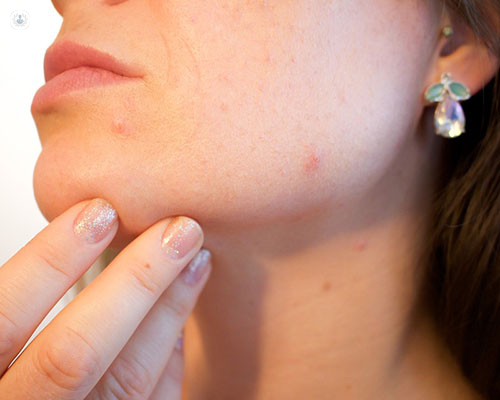Treatment of acne
Written by:Acne is probably the most frequent dermatological consultation and one of the cutaneous disorders that most dissatisfaction entails. Fortunately, any patient, with the right treatment, can receive help to make most of the acne-related lesions disappear.
At what age can I suffer from acne?
Acne can affect any age from neonates to adults over 50. We must discard the idea that acne is a consequence of age (puberty) and therefore necessarily go away after a while and does not require treatment. Treating the problem of acne from the beginning will avoid the appearance of scars, which, once established, are difficult to eliminate.
The success in the treatment against acne will depend on the adequate therapeutic selection depending on each patient, the type of acne lesions and the duration of it. We must assess factors such as age, work, presence of concomitant diseases and taking medication, the possibility of pregnancy and hygienic habits. In the dermatological visit we can establish a specific program of treatment against acne that can be modified later according to the evolution.
What types of treatments exist against acne?
In recent years new anti-acne treatments have been incorporated in the management of patients, especially in those with severe acne and scarring.. The treatment of acne will be divided into topical therapy, systemic therapy and physical therapies for acne and healing.

Topical therapy is useful in:
- mild and recent acne (basically adolescents with few "pimples" and few "pimples of pus" that when they leave do not leave a scar)
- moderate acne in combination with oral therapy
- as maintenance therapy after systemic treatment against acne
The most commonly used topical agents are: benzoyl peroxide, topical retinoids, topical antibiotics, salicylic acid, azelaic acid and the alpha hydroxyacids. These products can be used alone or in combination and in different concentrations. Sometimes "more intense" topical treatments can be useful to perform in the doctor's office (Peelings).
Systemic therapy includes:
- Oral antibiotics : used mainly in inflammatory acne. Antibiotics from the group of tetracyclines and macrolides are used. Currently, long-term antibiotic treatments are not prescribed because for the persistent and / or severe cases we have oral isotretinoin.
- Hormone therapy : oral contraceptives especially those that combine an estrogen with an anti-androgen progestogen are useful and sometimes even necessary in women whose acne has a clear relationship with hormonal changes or is associated with irregularities of the menstrual cycle.
- Oral isotretinoin : is the "great anti acne agent". Well used minimizes side effects, being very well tolerated. Currently we tend to use lower doses than previously used. Its problem is that it is teratogenic, having to avoid pregnancy while the treatment lasts and one month later.
Physical therapies for acne and healing : Surgical exeresis of comedones (pimples), micro cysts and acne cysts.
Photodynamic therapy : may be useful in the few cases of inflammatory acne in which oral treatment is contraindicated.
Treatment of scars. Lately the ablative fractional laser is used, which greatly improves acne scars by ostensibly shortening the recovery time.


